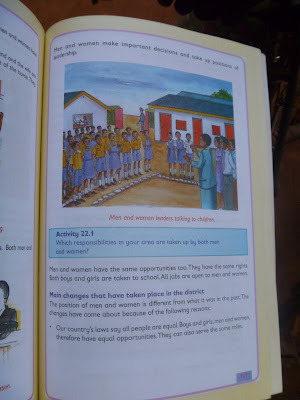
The elementary school students showed me their new books they waited most of the school year to read. Here are excerpts. Sorry they are so small.
The section on child abuse lists one cause of child abuse as "indiscipline among some children who may be stubborn." A bit disappointed with this, but it's balanced with an image a child being hit with a stick, meant to represent one form of child abuse - a tactic the school in Rubona most certainly uses, as I wrote about earlier.







There is also a nod to women's rights and equality, though the use of present tense - stating that women are now equal to men, as if there is no room for improvement - can be frustrating. Women's Day in Rwanda seemed to be all about how Rwanda has reached equality, and the elementary school textbooks are similar in this regard. This may be a good tactic, though - kids might be more likely to act a certain way if they think others are already acting that way.
There is a nice picture of a modern super market placed next to a picture of a traditional market. The super market is Nakumat, and is one of only two in the country, as far as I know. It's looks very organized, though empty, in the photo, and everything looks so easy to find next to the photo of the rural market. There is no mention of the fact that prices are about ten times as high in the super market, but I suppose these are nine year olds reading the book.
I liked the sentence "peace is affected when people engage in fighting." A bit circular, isn't it?
But this is for elementary school children, so alright.
The photo of the girl and boy riding their bikes seems a little inaccurate, because girls almost never ride bikes and are even less likely to have long hair, as it's not allowed in school. Though maybe it's the image of a brighter future for girl bike riders. I have noticed that boys not only are the ones who can ride a bike without social stigma, but they also get to ride on the back of their friends' bikes. It seems so unfair that girls walk in groups and boys ride their bikes in groups, getting home so much faster - something that leads to them staying in school for longer. One girl who helped me translate at a local seamstress also likes to ride a bike - or so I've been told. This fact came up in the local gossip, because a girl riding a bike is a big deal. She also whistles, which girls don't do, and plays football. Sometimes I whistle and people tell me I can't, because I'm a woman. And not a male cowboy, the typical whistlers.


Regarding girls riding bikes, Grandma Irene told me that when she was a child, maybe around 1903, and wanted to ride a bike, her father told her "Girls don't ride bikes!" And regarding girls playing football, Grandma Mollie once told me that Grandma Sarah (whom she knew when they were girls, because everyone in the Jewish community in Omaha knew everyone else), wouldn't play baseball, because she was too refined, or something like that. Grandma Mollie loved to play baseball as a girl, and apparently looked down on Grandma Sarah for having that attitude.
ReplyDelete